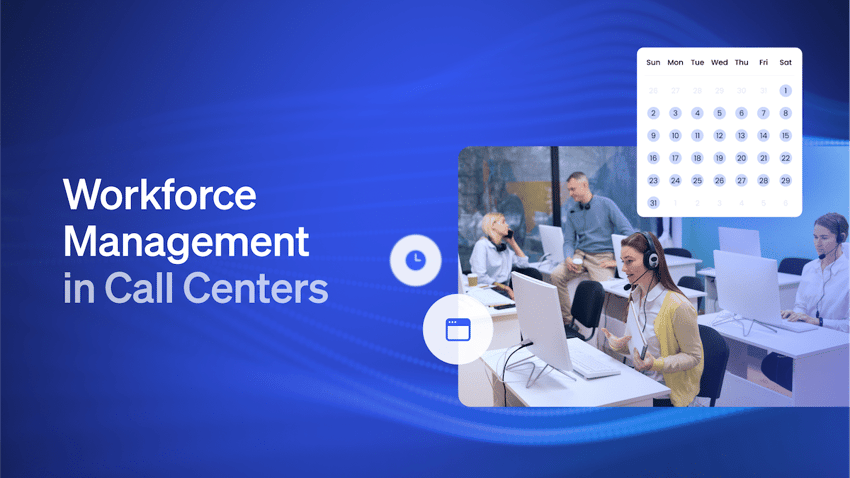If you’re looking for a genuine enterprise contact center solution, you are sure to have an important reason for doing so.
Whether you’re scaling up as part of a large project or your existing contact center software lacks functionality, a platform built for enterprise usage comes with significant advantages over small business solutions.
| Feature | Enterprise Contact Center | SMB Contact Center |
|---|---|---|
| Scale | Handles thousands or millions of interactions | Handles a modest number of interactions |
| Location | Geographic diversity allows for a global workforce with multi-language support | Localized or regional offers few language support features |
| Agent Volume | Handles hundreds or thousands of agents | Handles a handful to a few dozen agents |
| Call Routing | Allows complex call routing to multiple departments with sophisticated call flows | Allows basic call routing to a few departments with simple call flows |
| Security & Compliance | Meets industry-specific regulations and offers high levels of security | May have limited security features and compliance options |
| Onboarding & Support | Personalized onboarding, training & workshops, dedicated account manager, and ongoing support | Limited onboarding and support options |
Enterprise contact centers differ vastly in scale and configuration. As enterprises grow, SMB contact center solutions lack the scalability, advanced features, and robust security needed to handle a high volume of interactions and ensure customer satisfaction, which makes having a dedicated enterprise solution even more necessary.
See what Nextiva can do for your CX
Short on time? Experience our AI-powered contact center in minutes through quick, on-demand demos.
Let’s jump straight in with features we associate with rolling out enterprise-scale contact center solutions.
Contact Center Software Features for Enterprises
Large organizations’ use cases are different from those of small businesses. Below are some contact center features important to enterprises.
Multichannel support
While most small businesses use voice calls as their primary communication channel, often operating as call centers, enterprises prefer more communication channels, such as email, chat, social media, and SMS.
A multichannel contact center allows customers to choose their preferred channel, increasing customer comfort and reducing call queues.
Typically, the larger an enterprise, the higher the call volume, resulting in longer hold times. Longer hold times increase customer frustration. Freeing up your agents from lengthy phone calls can save time and improve customer satisfaction.

Omnichannel routing
The next level up from multichannel is omnichannel, which integrates digital channels and provides agents with a holistic view of all customer interactions.
Every agent has access to communications from all channels, including web chat, email, and social media, so the customer doesn’t have to repeat themselves.
Besides email, chat, social media, and SMS, enterprises can choose from other communication channels like web forms, video conferencing, and in-app messaging for customer service.
| Functionality | Multichannel Contact Center | Omnichannel Contact Center |
|---|---|---|
| Supports multiple channels | ✅ | ✅ |
| Allows for seamless switching between communication channels | ❌ | ✅ |
| Includes CRM integration for relevant customer data | ❌ | ✅ |
| Offers real-time insights into customer activity | ❌ | ✅ |
| Enables one team to handle requests across all channels | ❌ | ✅ |
Advanced IVR systems
An interactive voice response system (IVR) can benefit even the most basic call center solution. By providing callers with different number options, you help them reach the most qualified agent.
As the number of departments and callers increases, you will need more layers in your IVR. Each option can include a sub-menu. You can even use your IVR to send people to helpful resources on the web.
Your IVR can include self-service options so customers can pay their bills without holding for an agent. IVR-assisted security checks have simplified tasks like identity verification.
An advanced IVR can provide an efficient way to help your customers achieve their desired outcomes. It may take a little configuration, but customers will love you for the time it saves them.
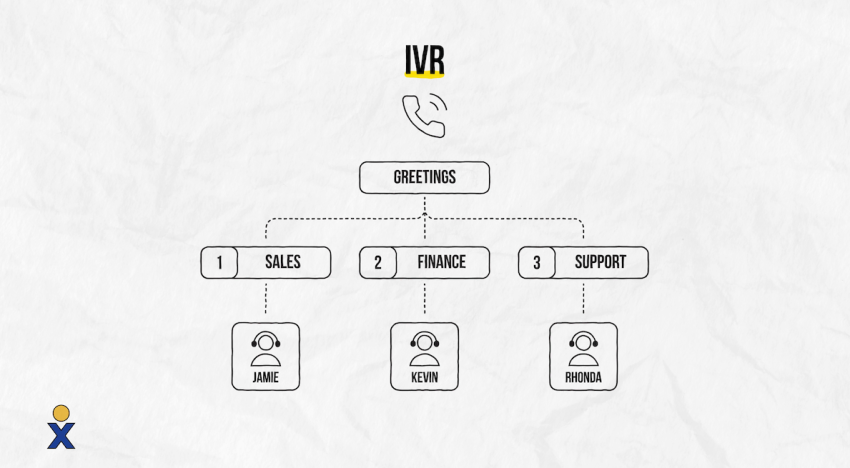
Related: What Is Outbound IVR? Use Cases and Examples
AI and machine learning
Small businesses have less need and appetite for artificial intelligence (AI) than enterprises.
If your business processes tons of data and needs to react to high demand or sudden spikes in call volumes, you need to know you’re making the best decisions — quickly.
AI-powered chatbots can answer basic customer questions 24/7, deflecting simple inquiries from live agents, so they focus on more complex issues. Chatbots also personalize interactions by remembering customer history and preferences, driving a more positive customer experience.
For example, instead of your agents fielding basic queries relating to opening times or redirecting calls to the right departments, an intelligent chatbot — backed by conversational AI and your company’s input — can understand the context and handle first-line inquiries into your helpdesk and sales teams.
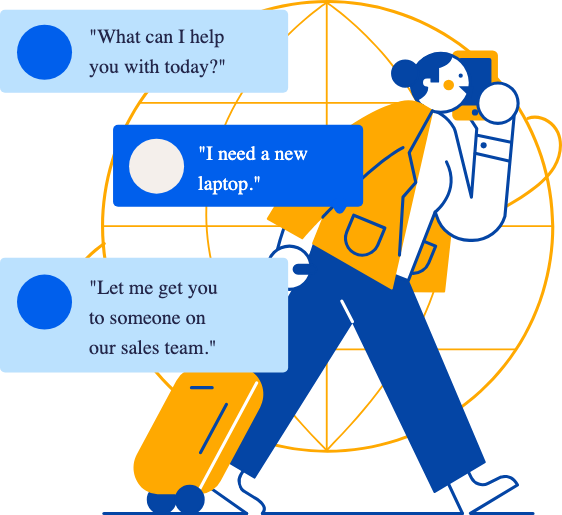
Workforce management tools
When you manage a large team, it’s tough to find the balance between covering all bases and being over capacity.
Call center features, such as workforce management, help with scheduling, forecasting, and real-time monitoring of agent performance and workload.
By collecting data and analyzing patterns, you can get information on when agents are most needed and when you can comfortably reduce the number of staff.
This allows agents to spend more time training and working on personal development and ensures your contact center is as lean as possible to generate a good return on investment.
CRM integration
While most cloud contact centers offer off-the-shelf integrations, enterprise software goes a step further.
How many contact centers aren’t using a CRM of some kind? Seamless integration with CRM systems is a basic requirement in the era of cloud technology.
With deeper CRM data access in enterprise contact center software, expect more relevant, real-time data utilization and customer history tracking.
Nextiva provides CRM integrations with the following enterprise solutions:
- Salesforce
- Microsoft Dynamics
- Microsoft Teams
- HubSpot
- Zendesk
- Zoho
- Oracle Sales Cloud
- Workbooks
- ServiceNow
- SugarCRM
- Act! CRM
- Lotus Notes
- ConnectWise
- GoldMine
- Bullhorn

Related: Why You Should Integrate Your CRM and Contact Center
Reporting and analytics
Although your organization might constantly collect and process data, they only become truly valuable when you can do something with them.
To best utilize your data, you’ve got two options:
- Hire someone to examine spreadsheets and databases all day, risking manual error and data corruption.
- Take advantage of comprehensive reporting tools to track key performance indicators, customer satisfaction metrics, and operational efficiency.
The top enterprise contact center solutions use a combination of AI, data modeling, and predictive analytics to provide reports that inform business decisions and improve employee and customer experiences.

Security and compliance
It goes without saying that all contact center software must be secure. However, enterprises have additional security and compliance standards to meet.
Make sure your next contact center purchase adheres to industry-specific guidelines, as well as basic guidelines, such as GDPR, HIPAA, or PCI DSS, should those apply to your organization. Secure contact center solutions should also offer data encryption in transit and at rest to protect sensitive customer information.
As standard, Nextiva ensures:
- 99.999% uptime
- 24/7 monitoring
- Real-time network status updates
- A full, uninterruptible power source per data center
- ISO/IEC 27001 certification
- SOC 2 compliance
- Regular penetration testing
- Call encryption
Related: Contact Center Architecture: How Contact Centers Work
Top 5 Enterprise Contact Center Providers
Choose from these five contact center providers if you’re serious about making a difference to your enterprise.
1. Nextiva
Features
Nextiva offers a unified communications as a service (UCaaS) platform that integrates voice, video, and messaging and an enterprise contact center platform.
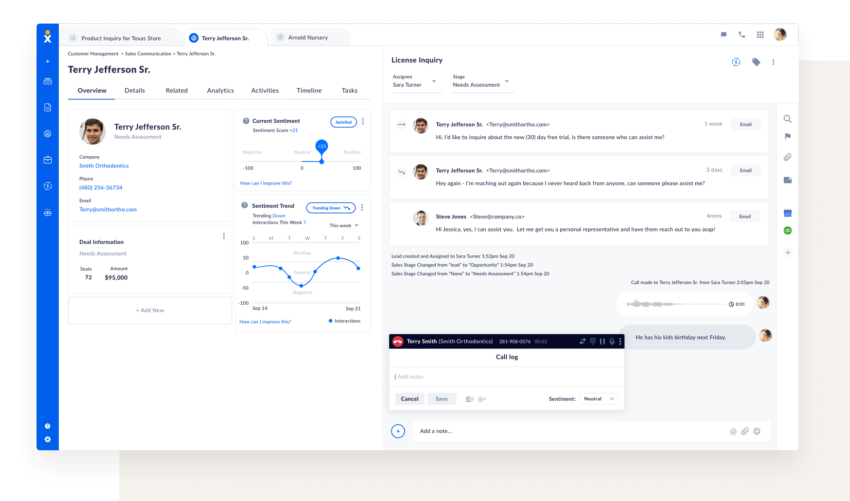
As standard, you get contact center features such as:
- Advanced IVR
- Customizable call routing
- Omnichannel support
- Predictive analytics
- Workforce management
- Single sign-on
In 2024, Nextiva acquired Thrio, adding many new enterprise capabilities, such as:
- Built-in AI assistant
- Dynamic scripting
- Native process automation
- Proactive customer notifications
- Intelligent display for all agent needs
Strengths
Nextiva provides UCaaS and a contact center as a service (CCaaS) in one platform. This means your business will get a single bill for its telephony and contact center infrastructure, and you benefit from on-net calling and simple internal transfers thanks to back-end integration.
Whether you use Nextiva for your telephony and your contact center or you’re integrating another contact center, such as Five9, with Nextiva’s business phone system, you get a streamlined experience for contact center agents, built-in video conferencing, a mobile app for on-the-go accessibility, and competitive pricing plans.
Note: Pricing for enterprise contact center solutions can vary depending on the number of agents you need, the features you require, and the deployment option you choose (cloud-based vs. on-premise).
2. Five9
Features
If you’re looking for an advanced AI-powered contact center solution, Five9 hits the nail on the head.
If you have a large business with scalability concerns or the desire to let your agents handle more value-added tasks while automating your run rate activities, Five9 focuses on making AI do the legwork so your agents remain efficient and productive.
Five9 excels at using AI to generate reports and provide sentiment analysis on customer transactions.
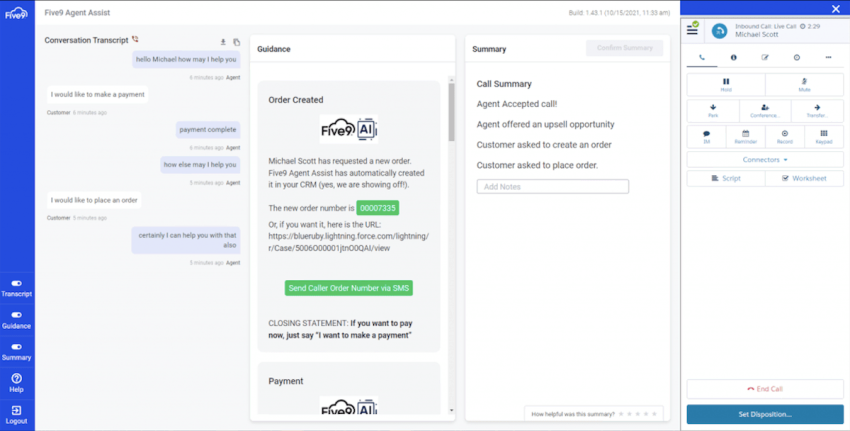
If your organization is data-driven with many customers and agents, Five9 could be a great way to help you maintain control of your contact center, with features such as:
- Agent Assist
- Call recording and transcription
- Workflow automation
- Digital engagement
- Conversational IVR
- Quality assurance
- Workforce management
Strengths
Five9 has a strong focus on AI and machine learning for improved efficiency and customer experience and a comprehensive set of features for inbound, outbound, and blended contact centers.
Nextiva works with Five9 to integrate your phone system and contact center. If your business runs a Five9 contact center and a Nextiva phone system, you can benefit from slick back-end integration to delight your customers every time.
3. 8×8
Features
8×8 offers an integrated cloud communications platform that combines contact center, voice, video, chat, and enterprise API solutions.
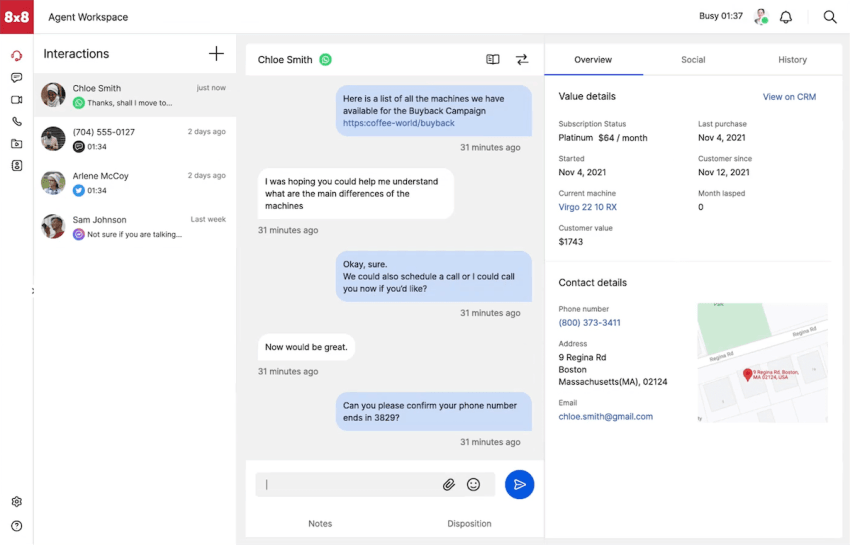
Thanks to previous acquisitions, such as Jitsi, 8×8 has a programmable feel to it, a little like CPaaS.
Enterprise features include:
- Omnichannel routing
- Workforce engagement management
- Speech and text analytics
- Quality management tools
- Co-browsing
- Customer journey mapping
Strengths
8×8 is an all-in-one, select-your-functionality cloud deployment that proves popular with prospective customers. The 8×8 pricing plan works out well if you have a large business with global calling needs and a generous budget.
It integrates with several CRMs and has competitive pricing for mid-market customers.
Read more: Looking For 8×8 Alternatives?
4. Genesys
Features
Genesys has been providing large businesses with on-premises, cloud, and hybrid contact centers for decades. It is recognized for its robust, scalable, and feature-rich contact center solutions.
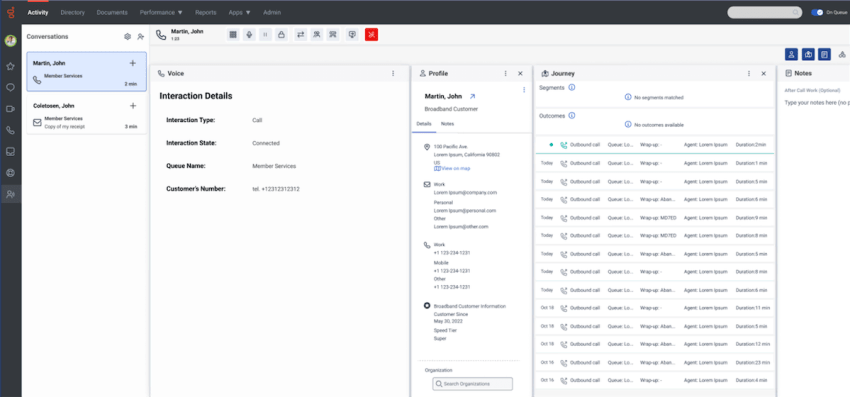
Alongside its ability to provide customizable deployment methods, enterprise-specific features include:
- Omnichannel customer engagement
- Workforce optimization
- Advanced AI and automation capabilities
- Predictive analytics
- Voicebots
- CRM integration
- Interaction recording
- Employee performance dashboards
Strengths
As one of the most comprehensive enterprise-grade solutions, there’s no doubt about Genesys’ scalability, boasting case studies like Vodafone and Sodexo with over 1,000 agents.
With robust omnichannel support, advanced self-service features (chatbots, voicebots, and knowledge bases), and integrations with enterprise-level applications, Genesys is a solid option for enterprise contact centers.
Related: 7 Genesys Alternatives to Make Scaling Your Contact Center Easier
5. Talkdesk
Features
Talkdesk is a cloud-based contact center solution known for its innovation and ease of use and is a big hit with small- to medium-sized businesses. But the scalability of its features is also worth considering.
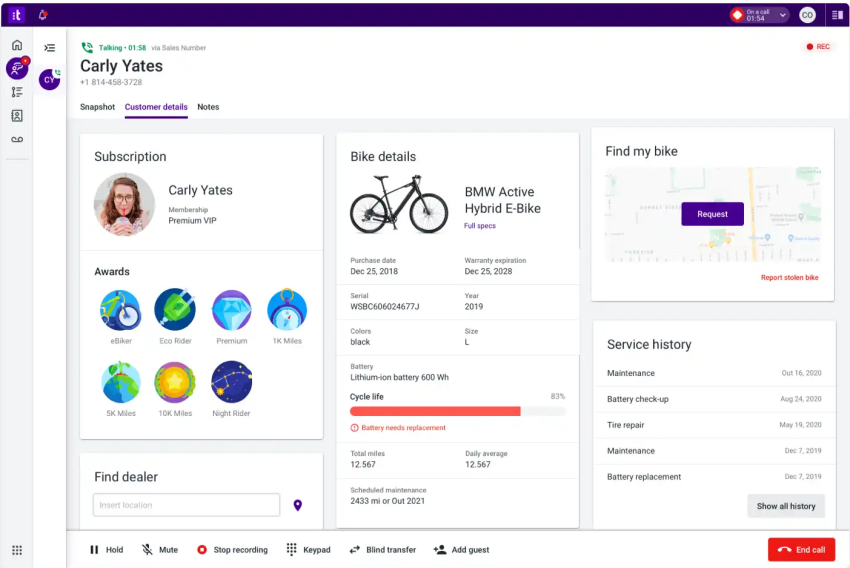
Enterprise features include:
- Predictive dialing
- REST APIs
- Call tracking
- Virtual agent
- AI trainer
- Quality management
- Workforce management
Related: Top 8 Talkdesk Alternatives for Contact Centers on a Budget
Strengths
Talkdesk is a user-friendly contact center platform with a strong emphasis on customer experience and innovation.
You get a flexible and easily adaptable platform that scales with seasonal or unplanned demand. As with most SaaS-based applications, flexing up and down is easy, thanks to a simple admin portal.
3 Types of Enterprise Contact Centers
Now that you know which features to look for in your enterprise procurement, it’s time to examine the types of contact centers available.
1. Inbound enterprise contact centers
Inbound contact centers primarily handle incoming communications from customers.
Typical use cases include:
- Providing customer service
- Offering technical support
- Responding to inquiries
- Managing complaints
- Providing order updates
One of the most important aspects of inbound contact centers is advanced call routing.
Features like skills-based routing direct calls to agents with the most relevant expertise and call deflection, which banks on self-service options like interactive voice response (IVR) menus to reduce the number of calls reaching live agents.
Intelligent call routing ensures a faster resolution for the customer and reduces burden on your contact center team.
Unlike traditional call centers, you’ll likely have several options per channel, per numeric option, and even per sub-menu. The technology you invest in will always be hard at work to ensure your customers get through to the right place in the most efficient manner.

2. Outbound enterprise contact centers
Outbound call centers are proactive and initiate contact with customers or potential customers.
Typical use cases include:
- Telemarketing
- Market research
- Lead generation
- Customer surveys
- Appointment reminders
- Information updates
Outbound call centers often use auto-dialer software to enable fast, accurate dialing by removing the possibility of user error.
Agents can use customer data and predictive analytics to target the right customers at the right time, increasing the effectiveness of campaigns.
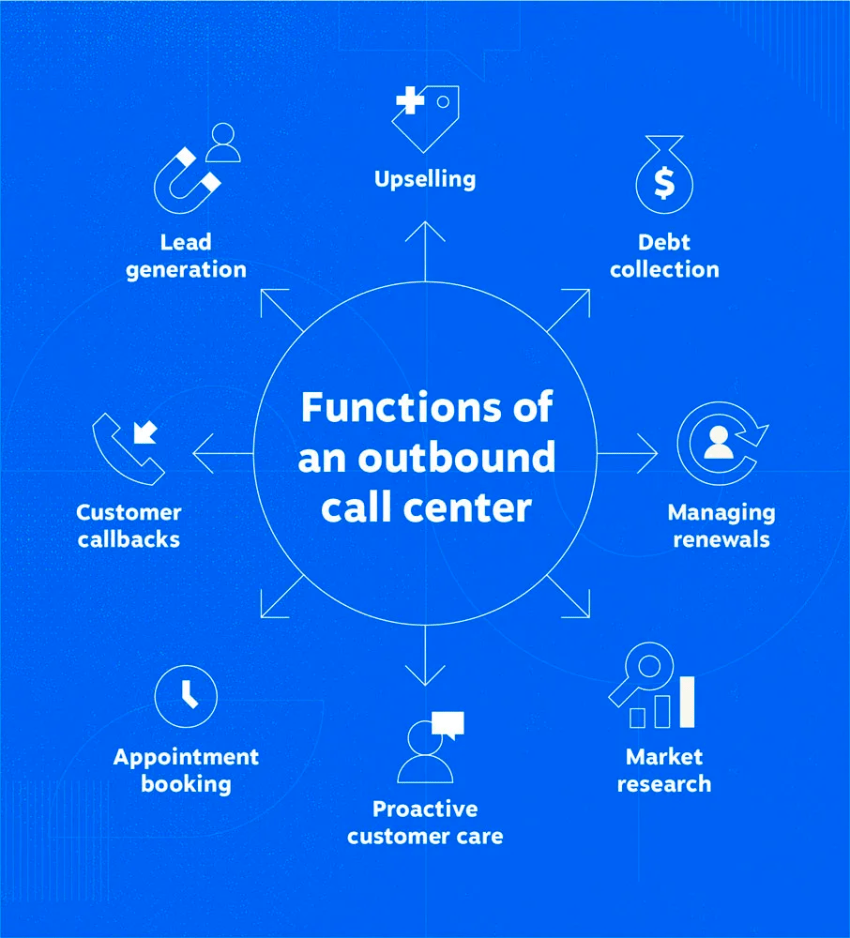
3. Blended enterprise contact centers
If you handle inbound inquiries and initiate outbound contact, you’re looking for a blended contact center.
This type of contact center combines the functions of inbound and outbound contact centers and is more expensive to operate. Agents need to be skilled in both call center aspects (inbound/outbound), or you can use specialized agents for each aspect.
With a holistic approach to customer engagement, you ensure consistency in customer interactions while offering a proactive, multichannel approach.

Enterprise Onboarding You Should Look For
Features and deployment models are key, but when implementing a new contact center platform at scale, here are some green flags to look out for.
✔️ Personalized implementation plan
No two enterprises are identical, so a cookie-cutter, templated approach won’t suffice. You’ve got unique business needs that your chosen provider should appreciate.
Expecting Demanding a tailored approach to setting up and configuring your solution isn’t asking for too much — it’s looking after your business’s best interests.
Most experienced vendors understand the need for a tailored approach for enterprise clients and will introduce this during the project planning phase
✔️ Training and workshops
With complex configuration and advanced features, such as workforce management and custom IVRs, it will take time for agents and supervisors to get up to speed.
When planning implementation and onboarding, put a comprehensive training plan for agents and admins. Ensure you have platform masters from day one so you’re best equipped to hit the ground running.
✔️ Technical support and consultation
You need guidance to correctly configure your new solution during onboarding and on an ongoing basis. Once you go live, you should expect continued support, though there may be levels (paid or otherwise) included with your plan.
The vendor is best positioned to provide that support, so ensure you have a thorough plan and escalation chart ready for support and best practices.
✔️ Help with data migration
Moving data from one platform to another is one of the biggest tasks in contact center migration.
Make sure your chosen vendor provides a tool or manual help to migrate existing customer data. Also, ensure data integration with other business systems, such as CRMs and ticketing systems, is addressed.
If you’re porting phone numbers (local or toll-free), make sure you understand the process, implications, and possible downtime.
✔️ Continuous education and updates
Once you are up and running, the software should run smoothly, but platform updates provide a continuous best-in-class experience.
Ask about a single portal to receive product updates and download new training materials, including documentation, videos, and online training, when they become available.
Customer Support You Should Look For
The benefit of moving to an enterprise cloud-based technology is that it is likely to run smoothly, but it pays to be prepared for every scenario. Check these support items before you make the leap.
✔️ 24/7 support
If you provide your customers with 24/7 support, receiving the same from your contact center platform is non-negotiable.
Round-the-clock customer support for technical issues is a must for most enterprises.
You also have self-service options like knowledge bases and FAQs to quickly find answers to common questions.
✔️ Dedicated account manager
Having someone who knows everything about your account helps understand your organization’s usage and long-term contact center strategy.
Channeling everything through a central contact ensures immediate support and reduces unnecessary explanations of your goals.
✔️ Regular performance reviews
As part of the experience of having a dedicated account manager, you can expect periodic assessments to ensure your chosen solution aligns with your business goals.
Cloud-based SaaS technology is flexible and scalable, so one of its major benefits is its adaptability to business conditions. As your business changes, quarterly or yearly performance reviews give you an opportunity to add or remove services as they become relevant or irrelevant to your business needs.

Enterprise Contact Center Software Built for the Future
Choosing a proven enterprise contact center provider pays dividends over opting for plug-and-play and hoping for the best.
When shopping around, make sure you look out for the following:
- Enterprise features such as workforce management, advanced IVR, and predictive analytics
- High levels of security and compliance with HIPAA, PCI DSS, and industry-specific regulations
- Ongoing support and a dedicated account manager
- Tailored onboarding and implementation planning
- CRM integrations and data migration from previous software
- Pricing that offers value for the budget
These game-changers help you filter out the “maybes” to create your shortlist.
Nextiva is a great fit for enterprises thanks to its world-class network security, reliability, and feature set.
With eight points of presence and carrier-grade data centers combined with N+1 (or greater) redundancy, Nextiva is uniquely positioned to look after your business while providing an easy-to-use interface packed with powerful features to keep your customers happy.
Simmons Bank, for example, migrated its 240 locations’ communications infrastructure to the cloud after its existing solution made scaling nearly impossible.
During its migration, Simmons Bank loved:
- Full concierge onboarding: For minimal disruption to the bank’s staff and customers
- On-site implementation and training: For fast go-live, user adoption, and training
- Call center reporting and analytics: For maximum visibility and control
- Advanced managed services: For augmenting their IT with account management experts
Looking for an enterprise contact center solution and want to see what all the buzz is about?
Related: Best Call Center Software to Try in 2024
The call center solution teams love.
All conversations in one platform. Empowering agents. Satisfying customers.


















 Customer Experience
Customer Experience 


![Best Contact Center Software Solutions Compared [Top 15]](https://www.nextiva.com/cdn-cgi/image/width=850,height=478,fit=cover,gravity=auto,format=auto/blog/wp-content/uploads/sites/10/2024/12/contact-center-software-hero.png?resize=768,432)







